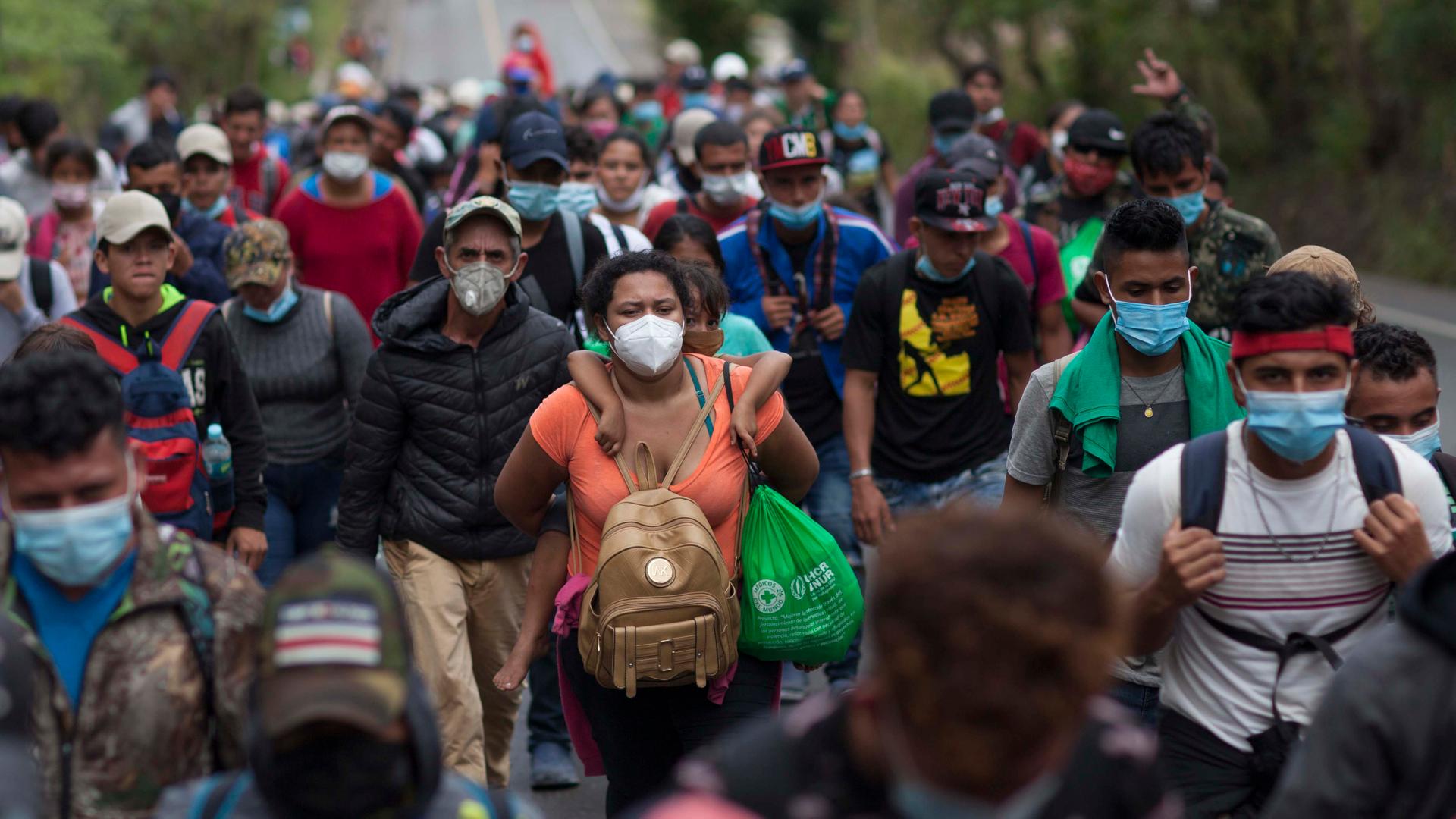How the Biden administration might undo some of Trump’s immigration policies
Guatemalan police and soldiers on Monday broke up a group of thousands of migrants who had spent two nights stuck at a roadblock on a rural highway.
By Tuesday, the group had dissipated in the face of Guatemalan security forces. Small groups pressed on toward the US-Mexico border.
Many of the migrants were driven by an increasingly desperate situation in Honduras, where the economic ravages of the COVID-19 pandemic and two major hurricanes in November have piled atop chronic poverty and gang violence. That, combined with a hope that the new US administration of President-elect Joe Biden would be more welcoming, set in motion the year’s first large group of migrants, a phenomenon largely known as “caravans.”
Guatemala’s tough stance toward the migrants is in large part due to policies put in place during the Trump administration. They include asylum cooperation agreements with El Salvador, Guatemala and Honduras, as well as threats of tariffs and aid withdrawal.
The incoming Biden administration has vowed to change those policies — though it will likely face challenges in doing so.
To understand the Biden administration’s approach to immigration, The World’s host Marco Werman spoke to Cris Ramón, an independent migration policy researcher and analyst.
Related: Why Biden’s day one promise to end ‘Remain in Mexico’ program may go unfulfilled
Marco Werman: What is the status of these asylum agreements that the Trump White House signed with Guatemala, Honduras and El Salvador?
Cris Ramón: The Guatemalan agreement was in place from fall 2019 into March 2020, when they were suspended due to the COVID-19 pandemic. I believe as of December 2020, the administration has now fully implemented these agreements. But what we haven’t really seen is any major reports of individuals being sent back to these countries.
So that’s — I think the status is that I think the administration went ahead and said, let’s just implement this before the incoming administration comes in and overturns them. But in terms of actual, real impact on migrant flows, I think this is just an implementation by name only. I don’t think it’s really been operational. And I don’t think we’ll be able to see it be fully operational before President Biden overturns them.
What has the Biden administration said so far about these agreements and what he’s going to do with them?
He’s going to overturn them. That’s the stated purpose. And he’s made this very clear that those are among the policies that the Trump administration has implemented at the US-Mexico border. And that’s something that he wants to overturn alongside other policies that the Trump administration has set up in place, like the Migrant Protection Protocols, family separation policies. This is part of the suite of policies that President-elect Biden wants to overturn.
So, if the Biden administration does unwind these agreements, what would happen next if, say, a large group of asylum-seekers and migrants get to the US-Mexico border even within the next few weeks or months?
The Trump administration maintains a suite of policies that is used to sort of determine how he’s going to remove migrants from the US-Mexico border. President Biden has said he wants to completely make a clean break from the Trump administration, and so he’s going to eliminate these policies. The thing is, it’s a question of when he’s going to eliminate those policies. And I think that’s been an area of major debate within the incoming administration and also more broadly with the immigration advocacy community.
Related: How Trump’s bilateral deals with Central American countries are undermining asylum
Do you see deportations continuing, though? I mean, deportation was a tool used a lot in President Obama’s immigration toolbox.
President-elect Biden has stated that he’s going to be issuing a moratorium on interior removals for 100 days. That’s something that he’s sort of been floating out there, and then assessing … ways that the United States could approach immigration enforcement differently.
What policy options are available if a Biden administration focuses on, say, the roots of why people are choosing to leave their homes — like no jobs, violence, or you mentioned natural disasters, like hurricanes or earthquakes?
The consensus that’s been done is basically providing development assistance to the three Northern Triangle [Central American] countries that targets economic development, rule of law and anticorruption practices, and … boosting human security for vulnerable populations such as women and girls. Those are … the three areas that you always focus on when addressing root causes. I think what’s important to know is that studies show that as you’re improving the conditions in these countries, it’s actually more likely that people will migrate because they have the means to do so, at least in the short-term. And over the long-term, people are going to stick around.
The other important thing is that studies also show that this kind of aid is good for improving the conditions, but the jury’s still out whether or not that actually deters emigration. And I think what you’re looking at [in terms of] development aid, you need to think of it as “we’re just simply going to improve the conditions in these countries.” I think it’s going to be hard for you to say, “we’re going to improve the conditions in this country so people don’t migrate.” And I think that’s where there has to be some nuance and understanding. We’re going to target causes to improve root causes. I think we need to be realistic as to whether targeting the root causes will completely eliminate the push factors for immigrants. I think let’s just improve these situations for the sake of improving them and then look at any additional benefits from that when it comes to migration management.
This interview has been edited and condensed for clarity. The Associated Press contributed to this story.
